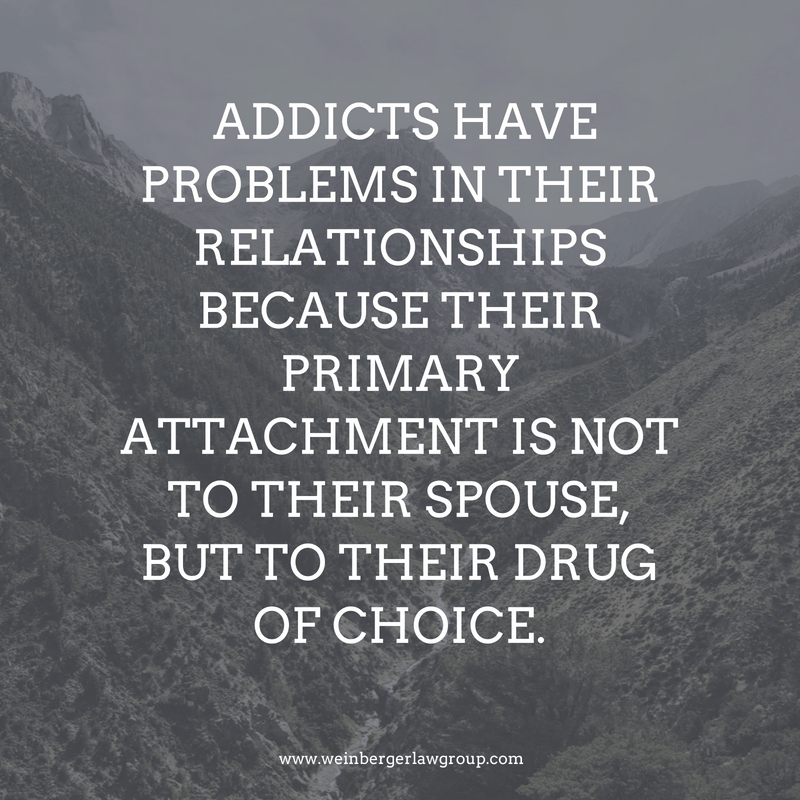7 Ways Addiction Can Destroy A Marriage

Addiction exacts such a heavy toll on marriage for one simple reason: Addicts have problems in their relationships because their primary attachment is not to their spouse, but to their drug of choice.
In fact, a recent study found that 48% of alcoholics will see their marriage end in divorce. Other forms of addiction — to drugs, sex, gambling, food, spending – also wreak havoc for the same reason: an addict’s obsession with getting their fix overrides the needs of their partner, family, bank account, career, and physical and mental health. Let’s explore the key ways addiction destroys marriages in more detail.
- Financial chaos. Addicts will spend whatever it takes to get what they want. Whether it’s several rounds of drinks at a bar, or a weekend of high-stakes poker, an addicted person will justify draining bank accounts because nothing is more important than scratching their itch. Expensive stints in rehabs, DUIs, debting-induced bankruptcy, are just more ways compulsive behavior strains marriages.
- Too much pressure on spouse. Spouses of addicts often become caretakers out of necessity. Because the addict is too preoccupied or sick to function properly, the spouse often has to shoulder all the burden of housekeeping, child-rearing, and income-earning. They also over-give emotionally, “propping up” the partner who provides little in return. They may feel abandoned due to the addict’s physical or emotional absence. The combined pressure and lack of support can cause the spouse to develop physical and mental health problems, including addiction, of their own.
- Job problems. Although some addicts are high-functioning enough to manage careers, most experience some level of dysfunction in the workplace. Alcohol, drugs, excessive use of porn, and various other sources of distraction make for an unreliable, under-performing employee. Job loss then leads to financial problems, which further strain marriages.
- Shattered trust. In order to trust your partner, you need to believe that they’ll do what they say most of the time. But people who are in the throes of addiction are inherently unreliable. They break promises, tell lies to cover their tracks, or say anything to get what they want with no serious thought of delivering. Even if they sincerely desire to stop their addiction, relapse is common in recovery. After years of broken promises, a spouse may not be willing to give the addict another chance.
- Explosive outbursts. Addicts have unmanaged emotions. They use substances or behaviors to control their moods. The problem is, their drug of choice may make them less inhibited, leading to volatile outbursts. Or, not being able to get their fix when they want it can leave them feeling irritable. Addicts tend to blame others for their problems, so family members are often on eggshells hoping to avoid confrontation. And sometimes, the non-addicted spouse erupts in anger over their partner’s behavior. Either way, chronic unchecked anger is corrosive.
- Sexual infidelity. Addicts tend to be compartmentalized people; they’re always covering up something. This “double life” may extend to extramarital affairs, especially for those who are sex addicts. It’s also not uncommon for the non-addicted spouse to have an affair because the feel emotionally abandoned by their partner.
- Growing apart during recovery. Sometimes recovery pushes people apart. The addict is no longer using, but may seem just as preoccupied with his or her recovery efforts and community. The codependent spouse who derives their self-worth from being a “fixer” may feel adrift now that that role is no longer required. Some couples find that the addiction was actually keeping them together, and without it, there’s not enough glue for a real relationship.
Marriages do survive addiction when both people are committed to recovery and to the hard work of building intimacy once the addictive substance or behavior is no longer in the way.
We understand that you may have questions about the legal side of addiction, infidelity, marriage, and understanding your options should you decide to divorce. Our caring, compassionate family law attorneys are here to provide confidential, nonjudgmental help. Please today at 888-888-0919 to schedule your confidential consultation, or click the button below.
Schedule a Confidential Consultation
Read More:
Is Your Cheating Spouse a Sex Addict?
“You’ll Never See Your Child Again!” Investigating Addiction In Custody Disputes
Parenting Time After Addiction Recovery




